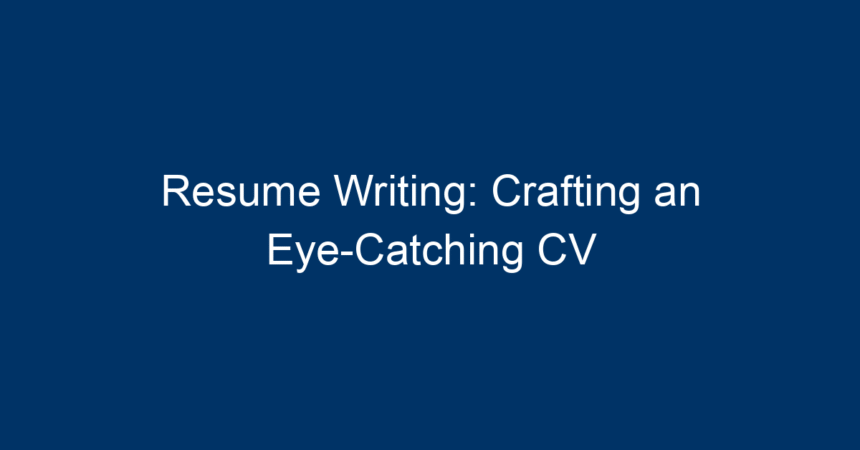In today’s fast-paced job market, first impressions matter more than ever. Your CV is often the first opportunity you have to make an impact on potential employers. That’s why effective resume writing is crucial. A well-crafted resume not only showcases your skills and experience but also tells a compelling story that engages recruiters. This article will guide you through the essentials of resume writing, ensuring your CV stands out in a crowded pool of applicants.
Understanding the Importance of a Strong CV
Why Your CV Matters
When you apply for a job, your CV is the gateway to the selection process. It summarizes your qualifications, skills, and achievements—essentially selling you to the hiring manager. An effective CV can mean the difference between landing an interview and being overlooked. Given that recruiters often spend mere seconds scanning each CV, making your resume visually appealing and easy to digest is vital.
The Role of Keywords
In the digital age, many companies use applicant tracking systems (ATS) to screen resumes before they ever reach human eyes. Therefore, including specific keywords relevant to the job description can enhance your CV’s chances of making it through this initial screening. This means that understanding the language of your target industry is essential for effective resume writing.
Elements of a Standout CV
1. Choosing the Right Format
The format of your CV is the first thing an employer will notice. Here are popular formats you might consider:
- Chronological: Lists work experience in reverse chronological order. Ideal for those with a consistent work history.
- Functional: Focuses on skills and experience rather than specific jobs. This is helpful for those switching industries or with gaps in employment.
- Combination: Merges both chronological and functional formats, allowing the applicant to highlight relevant skills while still showcasing their work history.
Choose a format that best aligns with your professional journey and the requirements of the job you’re aiming for.
2. Crafting a Compelling Summary
Your professional summary or objective should summarize your qualifications and career goals in 2-3 sentences. This section sets the tone for your CV and provides an elevator pitch to recruiters. Remember to incorporate relevant keywords to enhance visibility.
Example:
“Dynamic marketing professional with over 5 years of experience in digital marketing and a proven track record of increasing brand awareness. Seeking to leverage expertise in SEO and content strategy to drive results for [Company Name].”
3. Highlighting Key Skills
Creating a dedicated skills section allows you to showcase your most relevant qualifications. Use bullet points for clarity and structure, and tailor this section to include hard and soft skills related to the job posting.
Example Skills:
- SEO Optimization
- Project Management
- Team Leadership
- Data Analysis
4. Detailing Work Experience
When it comes to your work history, clarity is key. List your roles in reverse chronological order, and use bullet points to describe your responsibilities and achievements. Start each bullet with a strong action verb and quantify your accomplishments where possible.
Example:
- Increased website traffic by 40% through the implementation of a targeted SEO strategy.
- Led a team of five in planning and executing a successful product launch, resulting in a 30% sales increase in the first quarter.
5. Education and Certifications
Your educational background, including any certifications or relevant coursework, should follow your work experience. If you recently graduated, consider placing this section before your work history. Include:
- Degree obtained
- Institution name
- Graduation date (optional)
- Relevant certifications or ongoing education
6. Additional Sections to Consider
Depending on your field and the position you’re targeting, you might want to add sections such as:
- Volunteer Experience: Demonstrates your commitment and skills outside of paid work.
- Awards and Honors: Highlights recognition you’ve received for your contributions.
- Publications: Important for academic or research-oriented positions.
- Professional Memberships: Shows industry involvement.
Design and Visual Appeal
The Importance of White Space
A visually appealing CV enhances readability. Ensure there’s sufficient white space between sections, use a clean font, and stick to a consistent color palette. Avoid overly elaborate designs that can distract from the content.
Keeping it Concise
A common rule is to keep your CV to one page if you have less than ten years of experience. If you have more extensive experience, a two-page CV is acceptable. Be concise and ensure every word counts.
Tailoring Your CV for Each Application
One of the most important aspects of resume writing is customization. Each job is different; therefore, your CV should reflect the specific requirements and nuances of each role. Use the job description as a guide to identify which experiences and skills to highlight for maximum impact.
The Art of Keywords
Return to the job listing and identify critical skills and qualifications. Compare these with your CV, ensuring that your document speaks the same language as the employer’s needs.
Proofreading and Final Touches
The Importance of Clarity
Typos and grammatical errors can quickly undermine your professionalism. After drafting your CV, take time to proofread and review it. Tools like Grammarly can help catch errors, but consider having a trusted friend or mentor review your document too.
Ensure Consistency
Make sure your formatting is consistent throughout. Check that font sizes, bullet points, and spacing are uniform. This not only enhances readability but also gives your CV a polished look.
Final Tips for Exceptional Resume Writing
- Be Authentic: Don’t exaggerate your skills or experiences; honesty is vital in resume writing.
- Update Regularly: Frequently update your CV with new skills or experiences to ensure it’s always current.
- Include LinkedIn or Professional Website: If applicable, links to your LinkedIn profile or a professional portfolio can provide additional insights.
Conclusion
Crafting an eye-catching CV requires a blend of effective resume writing techniques and personalized touches. By focusing on clarity, relevance, and visual appeal, you can create a document that stands out to recruiters. Remember to tailor your CV for each position, emphasize your key skills, and ensure every element reflects your professional story. Armed with these insights, you are well on your way to landing that coveted interview. Start now, and let your resume be your ticket to a successful career!




